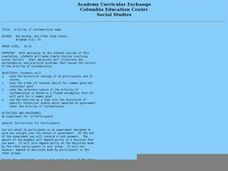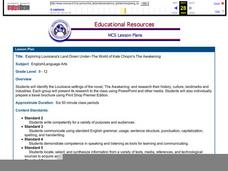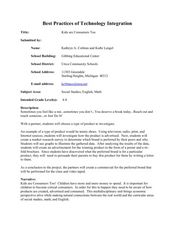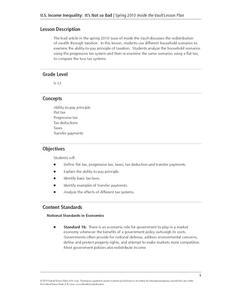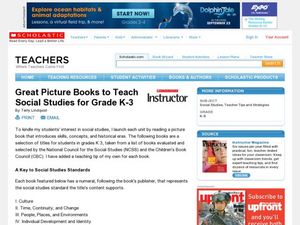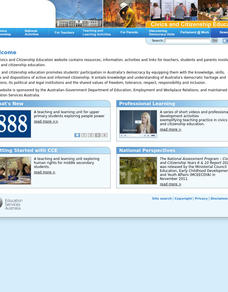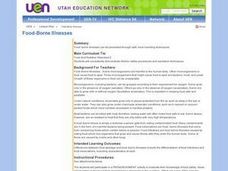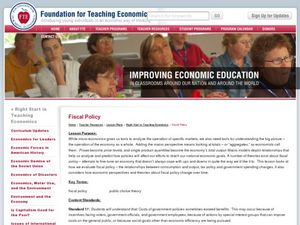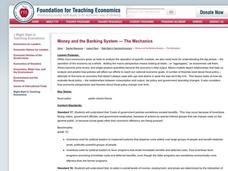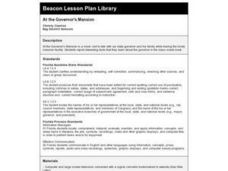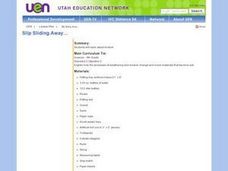Curated OER
Articles of Confederation Game
Why did the Articles of Confederation fail? Your historians will find out firsthand through this simulation activity, during which they will use money (consider using extra credit) to demonstrate the inherent flaws. It's simple: each...
Curated OER
The Future of Affirmative Action
High schoolers act as a representative of a particular interested group before a Senate subcommittee which is charged to determine the future of federal affirmative action programs in this country.
Curated OER
Voting and US Resident Aliens
Twelfth graders examine the process of voting. In this American Government lesson, 12th graders evaluate the arguments for and against alien voting. Students participate in a debate on voting rights.
Curated OER
Exploring Louisiana's Land Down Under - The World of Kate Chopin's The Awakening.
Visit 19th century Grand Isle, Cheniere Caminada, and New Orleans! Meet the inhabitants, learn about their history and culture, and view landmarks and industries! After reading Kate Chopin’s The Awakening, class groups research the...
Curated OER
Best Practices of Technology Integration
Learners are introduced to the functions of state and local government. In groups, they research Michigan as their home state and one other state given to them and answer questions given to them in a packet. They discuss their answers...
Federal Reserve Bank
U.S. Income Inequality: It's Not So Bad
What is the difference between a flat tax, progressive tax, tax deduction and transfer payments? Pupils examine the ability-to-pay principle of taxation through discussion, problem solving, and a variety of worksheets on topics from US...
Curated OER
Democracy is Cool
Learners discuss the components of a representative democracy. In groups, they create a t-shirt that shows the components and why it is "cool" to live in a democracy. As a class, they examine the concept of the common good and how...
Curated OER
Latin America and United States Policy Today
Students compare the situation of Latin American immigrants with the situation of immigrants from other areas of the world. They use media to obtain information on topics of academic interest, personal interest, and intellectual interest.
Curated OER
Great Picture Books to Teach Social Studies for Grade K-3
Every class enjoys reading new books at the beginning of a unit. Use this resource to identify a variety of books for kindergarten to third grade that can be used to complement social studies standards. The books can kindle learners'...
Curated OER
Can young people influence government?
Learners, working as a whole class, think about and debate the question of influence. First, there will be some group work then a class debate. The question for debate is: Can young citizens have any influence on governments?
Curated OER
Understanding Tibet
Students work in cooperative groups to read one current situation of Tibet. They respond to a set of discussion questions. Pupils write a newspaper article expressing the current information explored. Students write an editorial or...
Curated OER
Food-Borne Illnesses
Use this lesson to have your charges consider the differences between food spoilage and food-borne illnesses including the differentiation of food infections and food intoxication, including characteristics of each. Some excellent...
Curated OER
How Markets Work
Students explore the role of government in the economy market. For this economics lesson, students analyze the decision making and how it takes into consideration additional cost, benefits and public awareness of what they are trying to...
Curated OER
Money and Banking
Students explore the role of government in the economy market. In this economics activity, students analyze the decision making and how it takes into consideration additional cost, benefits and public awareness of what they are trying to...
Curated OER
The Cold War: Planning for Survival
Students prepare a documentary-style dramatization about government and personal measures taken to ensure survival in the event of nuclear war.
Curated OER
Coal Mine Industrial Picture Analysis
Students observe coal mine pictures. For this US history lesson, students analyze the pictures realizing that history is shown in pictures and then write a newspaper article about life in a coal town using the pictures as...
Curated OER
What Works and What Doesn't: The Potential and Limitations of Fiscal Policy
Twelfth graders study micro- and macro-economies. They examine theories about fiscal policy and the relationships between consumption and output, tax policy and government spending changes. They also consider how economic perspectives...
Curated OER
The future of Affirmative Action
Eleventh graders explore the term Affirmative Action. In this US History instructional activity, 11th graders create a presentation that will determine the future of federal affirmative action programs. Students write a...
Curated OER
United States Pride
Third graders learn the responsibility of citizenship and learn facts about a state they choose to research.
Curated OER
At the Governor's Mansion
Students visit Florida Governor's mansion online, and create class book about interesting facts and trivia.
Curated OER
The Bottom Line
Seventh graders assume the role of stockholders in a fictitious biotech company. After investigating the cloning of pets, the effects of cloning on the health and well being of the cloned animal, and the ethical issues involved, groups...
Curated OER
Erosion: Slip Sliding Away
Fourth graders investigate the causes of erosion. Through several demonstrations including one using sugar cubes and warm water, they observe the effects of erosion. In groups, 4th graders conduct similar experiments and record their...
Curated OER
Differential Thermal Calorimetry
Students access prior knowledge of infrared rays, ultraviolet rays, gamma rays, x-rays and cosmic waves. In this electromagnetic waves lesson, students hold a mock trial electromagnetic spectrum. Students present characteristics of the...
Curated OER
What is Democracy?
Students explore the facets of democracy. In this civic responsibility lesson, students create a definition of democracy and discuss the difference between a spectator and a participatory citizen. Students discuss whose responsibility...
